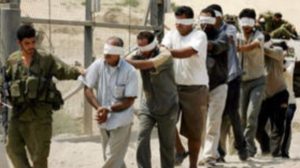Mideast ceasefire offers chance of freedom for Palestinian prisoners, Financial Times, Feb. 10, 2005.
Issa Abed Rabbo has been in prison since 1984 when at the age of 20 he shot dead an Israeli couple on the outskirts of Bethlehem. He was not a political activist and will not, his family say, return to violence.
“He has signed a pledge to work for peace and I want to plead with the parents of his victims to forgive him,” says his mother Amouna at her concrete home in the run-down Deheishe refugee camp.
The ceasefire agreement reached between Israel and the Palestinian Authority on Tuesday offers Mr Abed Raddo his best chance of freedom. His case and that of hundreds of other Palestinian prisoners are now at the heart of the next stage in any peace process.
Mrs Abed Rabbo voted for Mahmoud Abbas, Palestinian Authority president, in last month’s elections. He has pledged to work for the release of prisoners such as her son to help consolidate moves towards peace following the mutual ceasefire agreement reached with Ariel Sharon, Israeli prime minister.
Israel intends to free an initial 900 prisoners out of a total of some 8,000, but none with “blood on their hands”. Should the ceasefire hold, Mr Sharon could come under greater pressure to free more prisoners but there is strong resistance from many Israelis, who have suffered almost 1,000 deaths in the last four years of fighting.
In the same period 3,350 Palestinians have been killed and almost every Palestinian family has members who were killed, hurt or imprisoned. Mr Abbas, who is trying to persuade the militants to hold their fire, has told Mr
Sharon that releasing prisoners would favourably alter public opinion.
“The more we work together, the more we will reduce the cracks through which the extremists will try to get through,” said Mr Abbas. “We know that they intend to blow up the process.”
Underlining this point Mr Abbas yesterday sent a top aide to Lebanon for talks with Hizbollah leaders, in a bid to prevent the group from trying to wreck the ceasefire.
Israel and the Palestinians agreed this week to form a number of committees to discuss issues such as prisoner releases and Israeli military withdrawals from West Bank cities over the next few weeks.
Such measures would go a long way to bolster tentative hopes for peace but analysts caution that both sides are unlikely to reach agreement any time soon on so-called final status issues, such as borders, refugees and the division of Jerusalem.
A first batch of 500 prisoners is expected to be freed next week and there is widespread Palestinian pressure on Mr Abbas to achieve further releases, particularly to include women, the young and those jailed before the first intifada that started in 1987 and the subsequent Oslo interim accords of the early 1990s.
One of Issa Abed Rabbo’s former cellmates thinks fervently he should be released, arguing that he has achieved rehabilitation in jail through informal prisoner networks.
“He wasn’t a member of any political faction. He was totally unbalanced and the boy had an abnormal upbringing, his father used to beat him,” says the former prisoner, who served six years for throwing a bomb at a bus carrying Jewish settlers and did not wish to be identified. “The other prisoners worked hard to bring him up, taught him how to read and write and he’s definitely better now.”
Meanwhile yesterday, regional moves towards peace took place with Egypt announcing the return of its ambassador – after a break of more than four years – to Israel within the next 10 days or so.
Cairo’s envoy was withdrawn in November 2000 to protest after the start of the intifada, or uprising. Jordan has also said it will return its ambassador.
Britain announced yesterday that representatives of the Middle East quartet – the US, Russia, European Union and United Nations – would meet at a conference on Palestinian reform in London on March 1. Signalling the domestic opposition Mr Sharon faces over his withdrawal plan, Silvan Shalom, foreign minister, said yesterday he would push for a nationwide referendum on it. Mr Sharon reiterated he would not give in to such demands.




